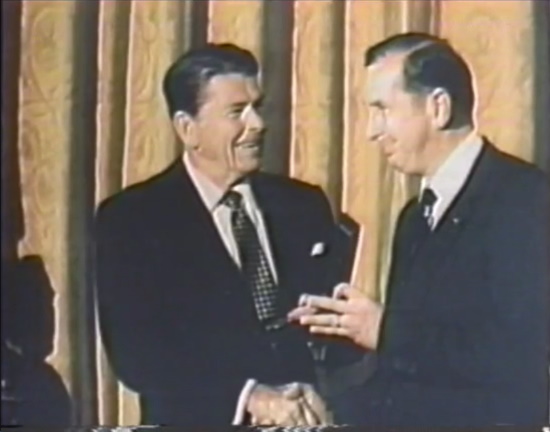This week, the MassMATCH community is saddened to learn of the passing of our friend, colleague, and longtime Advisory Council Member, Dr. Lester (“Les”) W. Cory. Dr. Cory passed away peacefully surrounded by his family on Friday, April 24th.
MassMATCH was fortunate to have had Dr. Cory’s service on the Council since our program’s inception in 2007.
“Dr. Cory was a pioneer in the field of assistive technology,” reflects Ann Shor, Director of Independent Living and Assistive Technology Programs at the Mass. Rehabilitation Commission. “He was so important in developing the MassMATCH programs and was truly a leader in making AT accessible for all who needed it. He was also a kind and thoughtful man who will be sorely missed.”
Dr. Cory lived through and contributed to an important part of modern assistive technology history. He broke new ground for the fields of AT and rehabilitation engineering, and yet his legacy is as much about overturning conventional perceptions of what it means to have a disability as it is to tear down barriers for individuals with disabilities.
Many of us are familiar with Stephen Hawking, the renowned physicist with ALS who was an early adopter of assistive technology for speech generation. But years before Stephen Hawking needed augmentative and assistive communication (AAC), Dr. Cory, a professor of electrical and computer engineering, was building a computer voice solution for a young woman with cerebral palsy he’d read about in the local newspaper.
Linda Texceira is the first person to gain speech using a computer with a speech synthesizer for personal use. Dr. Cory’s innovation drew attention from the Boston Globe and USA Today. By 1985, Dr. Cory was at the White House receiving the Volunteer Action Award from President Ronald Reagan.
In 2012, MassMATCH Quarterly News interviewed Dr. Cory and learned about his work with the Texceira family, a story he’d told many times over the previous 30 years. Linda, he explained, was 24 years old when he met her; she had a fourth-grade education and communicated with her eyes using a Plexiglass letter board to spell messages to her mother. He emphasized fundamental lessons Linda Texceira soon taught him: don’t make assumptions about another person’s capabilities, drive, or ambition, regardless of their disability. Do ask for their own goals. In this way, Dr. Cory arrived at key principles shared by disability advocates, principles that help guide MassMATCH, the Mass. Rehabilitation Commission and our program partners today.
Dr. Cory asked and learned that what Linda wanted was a high school diploma so she could get a job. In 2012, he explained:
“Here was a person who didn’t speak or use her hands or walk, and she’s saying she wants a job. So I asked her, What would you want to do? And she told me, ‘I want to do something to help people less fortunate than myself.'”
Her words left a deep impression.
This is how Linda Texceira became the first client of the nonprofit SHARE Foundation, the Society for Human Advancement through Rehabilitation Engineering. Dr. Cory founded SHARE in 1983, along with colleagues Phil Viall and Richard Walder, at what was then Southeastern Massachusetts University (now UMass Dartmouth). Its mission is “to empower physically challenged, non-speaking children and adults to express their basic wants and needs, communicate with others, control their immediate environments, and achieve the greatest practical level of independence.”
The following year he became the founding director of the university’s Center for Rehabilitation Engineering. With funding from SHARE (and a contract with the Mass. Rehabilitation Commission), the Center went go on to assist over 3,800 individuals in 38 states and 8 countries with highly customized systems they fabricated, programmed, and/or adapted to suit each individual. The systems are re-engineered again and again for each person’s changing needs and goals. SHARE’s client relationships last decades, Linda Texceira included.
In 1991, Texceira earned her GED with the use of SHARE-designed technology. She later went on to take English courses at a community college. She has given numerous presentations on her journey with SHARE over the years, and she enjoys writing poetry (read the complete 2012 article at this archived edition of MassMATCH Quarterly News as well as a poem by Linda Texceira).
Dr. Cory retired from UMass Dartmouth as Chancellor Professor Emeritus in 2008, but he continued fundraising for the SHARE Foundation for years after. In 2012 he told us SHARE was providing ongoing technical support to over 1,000 individuals. Fundraising was not what he preferred to do but he was mindful of all the people waiting for services, he said.
In 2016, for an interview with South Coast Today, Dr. Cory was very much looking toward the future of technology. He was excited for what the dawning of computer-brain interfaces and virtual reality would do and mean for individuals with disabilities.
Kara Caldarone, Chief Development Officer for the SHARE Foundation, assures us, “We will continue to carry on his legacy through the support of our community, investors, family, and friends. Together we’ll bring SHARE to the next level of success for the next thirty years.”
The family plans a memorial at a future date beyond current restrictions on gathering. Memorial donations can be made to SHARE Foundation, 128 Union St., STE. LL3#6 New Bedford, MA 02740.

